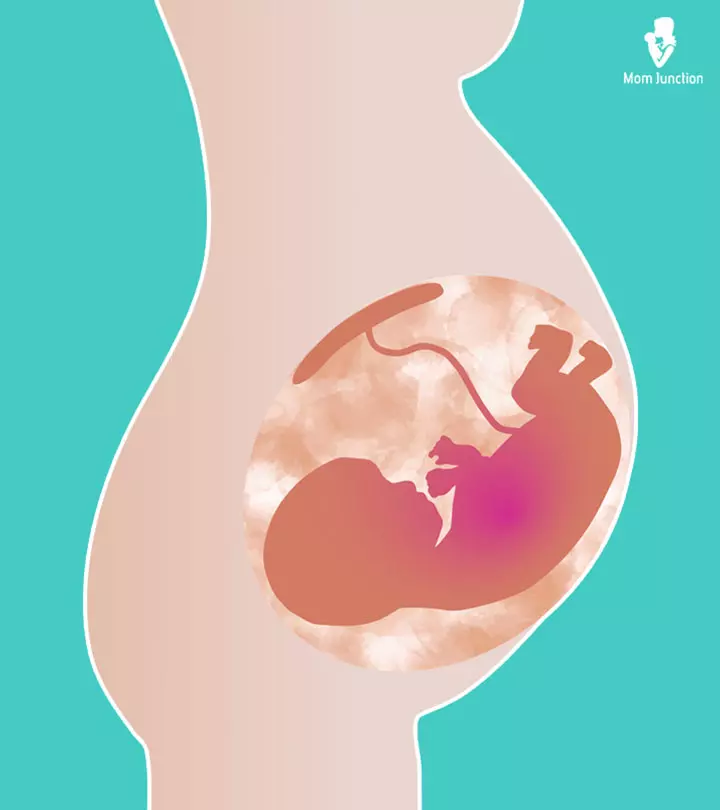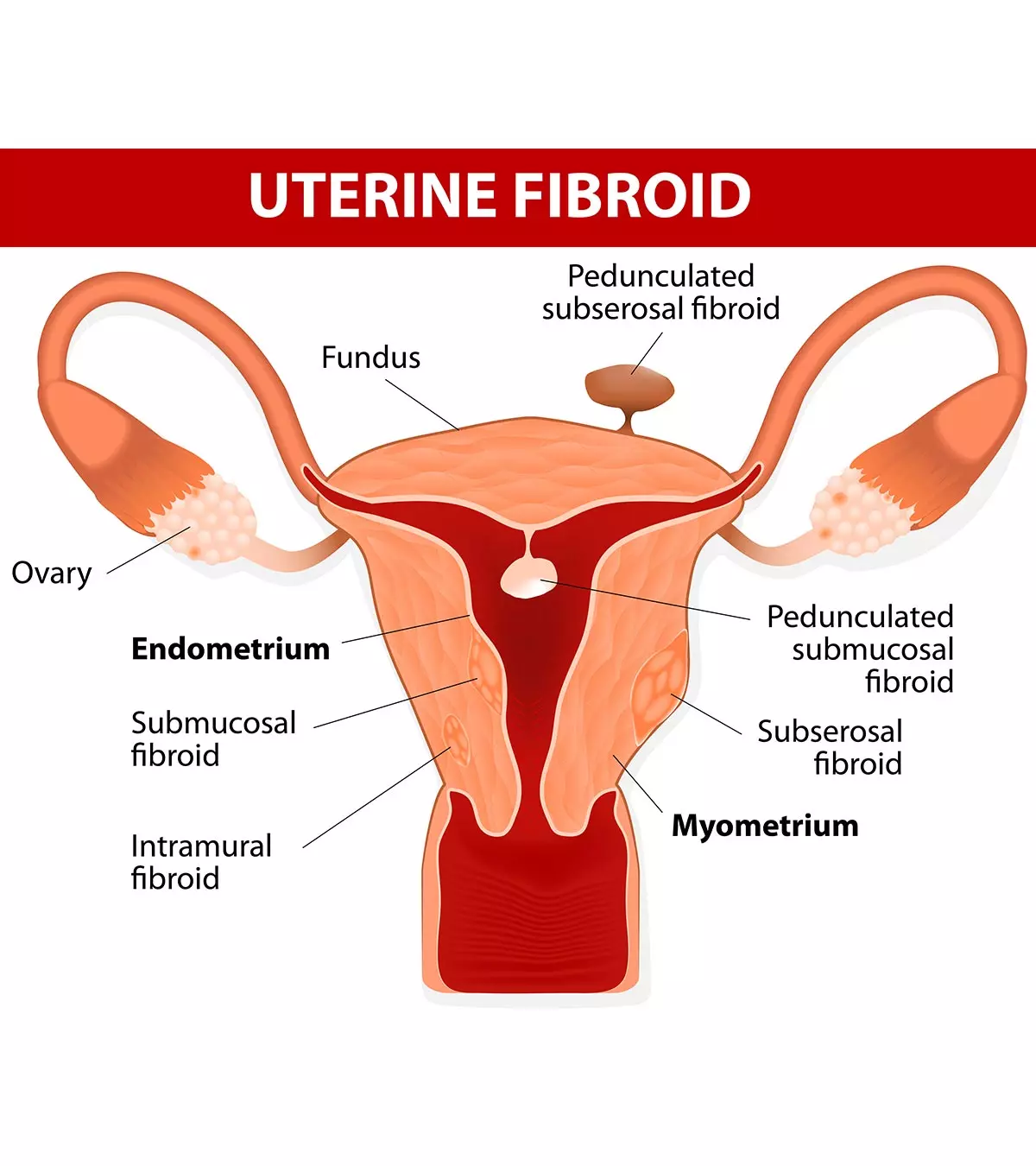
Image: Shutterstock
While some adults use essential oils to deal with teeth and gum pain, one must be careful before deciding whether it is safe to use essential oils for teething in babies. Teething is an important milestone, and it usually starts between four and seven months. Most babies receive all 20 of their teeth by 30 months (1)(2). Gum irritation during the teething period can disturb the baby’s sleep and feeding patterns. However, according to the American Dental Association (ADA), a gentle finger massage on the baby’s gums can help provide some relief (3). Read this post to know if there is any medical evidence regarding the benefits of using essential oils to soothe teething babies and what precautions should be kept in mind.
Key Pointers
- Topical application of some essential oils can help reduce gum inflammation, relieve soreness and prevent secondary gum infections.
- It is not safe to use essential oils for babies of less than three months.
- Your pediatrician may prescribe some essential oils, such as chamomile, lavender, dill, ginger, and marjoram, based on your child’s age and other factors.
Are Essential Oils Safe For Teething Babies?
The American Association of Naturopathic Physicians does not recommend using essential oils at all on babies younger than three months.
The safety of essential oils varies depending on its intent of use (coliciA frequent pattern of fussiness or crying in a healthy and well-fed infant. or teething), method of application (topical or diffusion), and the baby’s age and health condition (4). Some essential oils could be safe when used for babies of a certain age group. Older babies may be able to use more types of essential oils than younger infants.
Nevertheless, the safety and suitability may differ among babies of the same age group. Therefore, it is best to consult a certified aromatherapist, essential oil practitioner, or pediatrician before trying essential oils for teething. An expert would tell you the right type and dosage of the essential oil to avoid any adverse reactions.
How Might Essential Oils Help Babies With Teething Pain?

Scientific studies that describe the mechanism of action of essential oils in reducing teething pain in babies are scarce. However, some believe that the topical application or diffusion of essential oils may help by:
- Alleviating the inflammation of the gums and subsiding their tenderness.
- Relieving the pain so that the baby feels calm and relaxed.
- Preventing or reducing infections that may occur due to gum inflammation.
If using essential oils, they should always be diluted in a base or carrier oil before topical application. You can gently massage the baby’s gums with the diluted oil or apply it along the jawline. Diffusing essential oils does not directly affect the gums but may create a calming environment for the baby. However, it is extremely important to consult a pediatrician before using them for teething pain.
Essential Oils To Relieve Teething Pain
You may consider using essential oil when the baby begins teething after the age of four months. When selecting an essential oil for your baby, consider their age, skin sensitivity, and any known allergies. Not all oils are suitable for every baby, so individual assessment is key to ensuring safety and effectiveness. Do not use essential oils for babies younger than three months since they have sensitive skin and bodies (5). It’s always recommended to seek advice from a healthcare practitioner before using essential oils to ensure safety.
Below is a list of essential oils you may try to relieve your baby’s teething pain after consulting a pediatrician, certified aromatherapist, or essential oil practitioner.
For babies older than four months
1. Chamomile (Matricaria recutita or Chamaemelum nobile)

Research shows that the topical application of chamomile extract could relieve teething pain and irritability in babies (6). Mix a drop or two of chamomile essential oil to a base or carrier oil and rub it in a circular motion on your baby’s gums to subside teething pain. You may also dip a washcloth in chamomile tea and give it to your infant to chew (7).
 Do remember
Do remember2. Lavender (Lavandula angustifolia)
The fragrance of lavender’s essential oil has soothing properties, making it popular in aromatherapy. Smelling lavender oil could reduce pain in infants, and it might also relieve teething pain (8) (9). You may diffuse lavender oil in the baby’s room using an essential oil diffuser or leave cotton balls dipped in the oil near the baby’s crib.
Additionally, a study states, “Lavender species offer a promising alternative to some of the synthetic materials in the field of dental sciences. It may be used to treat local infections, as an alternative to antibiotics, in reducing dental anxiety, or to prevent the formation of biofilm on teeth (10).”
3. Dill (Anethum graveolens)
Dill has anti-inflammatory properties that may help soothe tender gums and alleviate teething pain (11). Mix a drop or two of dill essential oil with a carrier oil and rub the oil blend on sore gums.
For babies older than six months
4. Ginger (Zingiber officinale)
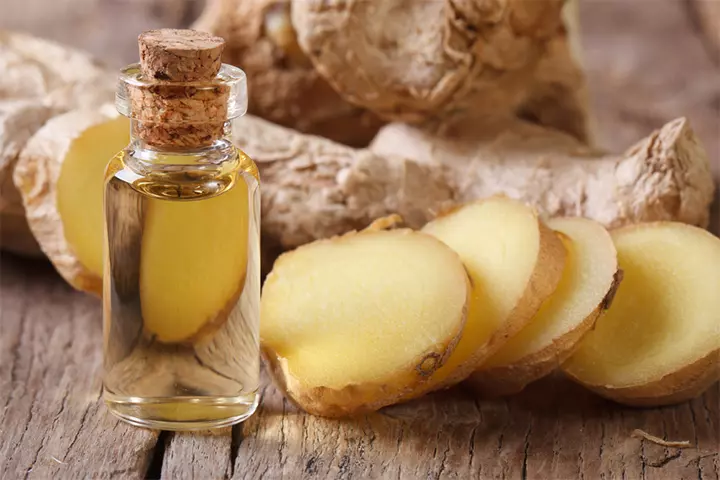
Ginger is popular for its antimicrobial properties (12). A study noted that ginger’s analgesic (pain-relieving) and anti-inflammatory properties were comparable to ibuprofen (13). These properties may help relieve teething pain. You may mix a drop of ginger oil in a carrier oil and gently massage the baby’s sore gums.
5. Marjoram (Origanum majorana)
Marjoram, also known as sweet marjoram, is a common culinary herb also used in traditional medicine to relieve pain (14). You may try marjoram essential oil to relieve the baby’s teething pain. Mix a drop of it in a base oil and use it to massage the baby’s gums.
For babies older than two years
6. Copaiba (Copaifera langsdorffii)
Copaiba essential oil is popular in traditional medicine due to its anti-inflammatory and antiseptic properties (15). Research highlights that copaiba oil also possesses pain-relieving effects, which may help relieve teething pain in infants (16). Add a drop or two of the oil to carrier oil before using it for babies.
7. Clove bud (Eugenia caryophyllata)
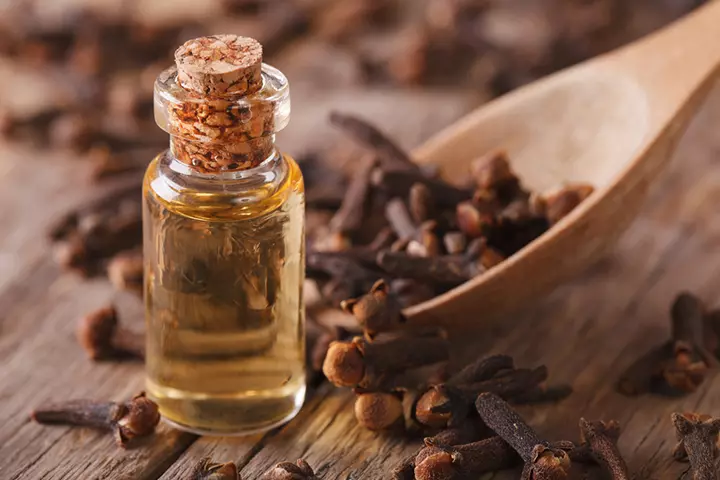
Clove oil contains a compound called eugenol, which is considered an effective natural remedy to relieve toothache in adults and teething pain in babies (17) (18). You may dissolve a drop of clove oil in a carrier oil and massage the baby’s gum.
Always use essential oils diluted in a carrier or base oil, which can be any vegetable oil (19). You may also consider using hydrosols, which are water-based extracts of plants with a small quantity of essential oil in them (20). A hydrosol might be a suitable alternative to essential oil for some babies.
Sandy Philpott recalls how her mother used clove oil to alleviate her teething discomfort during infancy. She says, “When I was a baby, my mother kept a tiny vial of oil of cloves in the medicine cabinet to rub on my gums. I’ve smelled that stuff, and I admit that it may or may not have dulled the pain, but it certainly would have created a sensory distraction (i).”
8. Frankincense (Boswellia carterii)
Frankincense essential oil is known for its anti-inflammatory properties and may help soothe teething pain (21). Dilute it in a carrier oil and apply gently to the gums. Always consult a pediatrician before use.
 Point to consider
Point to considerPrecautions To Take While Using Essential Oils For Babies
Remember that babies and children should never ingest essential oils. Observe the following safety tips while using essential oils for babies (19) (22) (23).
- Consult a certified herbalist or essential oil expert before using essential oils for babies, especially if they have underlying health conditions or are on medication. It is crucial to discuss any potential interactions or side effects that essential oils may have with your baby’s current treatments.
- Buy pure essential oils from a trusted source, as adulterated essential oils increase the risk of adverse reactions.
- Look for specific information on the label, such as the plant’s Latin and common name, the plant part from which the oil was extracted (flower, leaf, bark, fruit, seed, or root), country of origin, and extraction method. It is necessary to ensure product quality.
- Follow the recommended dosage and avoid overuse to mitigate any adverse effects.
- Dilute essential oils in carrier oils as per the prescribed dilution ratio. For babies and children, the dilution ratio ranges from 0.1 to 5 percent. Consult an expert to know the precise dilution ratio for an oil.

- Choose a carrier oil that is mild on the baby’s sensitive mucous membrane. For instance, fractionated coconut oiliA lighter, less greasy form of coconut oil obtained by removing certain fats. or virgin coconut oil is a general recommendation. Speak to an essential oil expert to know more about suitable carrier oils.
- Do a patch test for the carrier oil alone to rule out any allergies due to the base oil.
- Do a patch test of the essential oil and carrier oil mix to rule out the possibility of allergic reactions or cross-reactivity. If your baby has allergies or a family history of allergies and sensitivities, consult a pediatrician before use.
- If your baby has any medical conditions or is on medications, use essential oils after consulting the doctor to prevent possible drug interactions.
- Discontinue using the essential oil if the baby exhibits signs of sensitivity, such as visible skin irritation or uncontrolled crying. You can apply a small amount of vegetable oil or full-fat milk to soothe the affected area.
- Keep essential oils in tinted glass bottles and store them in a cool, dark place, away from sunlight, to preserve their quality.
- Diffuse essential oils in a ventilated area for no more than 20 minutes. Prolonged inhalation may irritate the baby’s airways. Avoid essential oil diffusion if the baby has asthma or has a family history of respiratory allergies.
Other Remedies For Teething Pain
While teething itself is not an illness, managing the associated discomfort can help keep your baby calm and comfortable. Below are some safe and effective remedies recommended by health experts to soothe teething pain (24)(25)(26).
- Gum massage: Rubbing your baby’s gums gently with a clean finger by applying light pressure to the sore areas can provide relief.
- Cold compress: Offering a chilled (not frozen) wet washcloth or a spoon or pacifier to bite on can offer some relief. Make sure that these items are clean and large enough to prevent choking.
- Teething toys: Biting on a firm teething toy or ring made of rubber, silicone, or wood may alleviate the pain associated with teething. Liquid-filled or plastic toys that might break are not recommended.
- Cold foods: For babies already consuming solid foods, offering chilled applesauce, yogurt, or mashed bananas can provide a soothing effect on the gums.
- Pain relievers: If your baby is especially fussy, consult your pediatrician. The doctor may recommend administering acetaminophen (Tylenol) or, for infants over six months, ibuprofen (Advil, Motrin).
Frequently Asked Questions
1. How can I naturally soothe my teething baby?
Using cold, wet washcloths to massage the baby’s gums, using teething rings, feeding soft and cold food, and rubbing the baby’s gums with a clean finger are some ways to soothe your baby’s sore gums while teething (27)
2. How do I speed up a tooth eruption for a teething baby?
It is impossible to speed up tooth eruption. The tooth erupting from the gums may take around eight days (four days before and three days after) to break through. It may take longer for some babies (28).
3. How long does intense teething pain last?
Intense teething pain may last a few days before and after the tooth erupts through the gums. However, it may differ for each baby. If the intense pain continues for more than a week, you may consult your doctor.
4. What are the potential risks of using essential oils for teething?
Some potential risks of using essential oils for teething may include toxicity due to accidental ingestion of a greater quantity of essential oils and allergic reactions to certain oils (22) (29).
5. Are there any essential oils that are not recommended for teething?
Essential oils such as camphor oil, nutmeg, eucalyptus oil, and wintergreen oil are considered toxic and may not be recommended for baby teething (29). Some such as tea tree oil, ylang-ylang oil, peppermint oil, and rosemary oil are not recommended for children below six years of age.
6. Can babies have peppermint oil for teething?
According to Dr. Scott Cardall, orthodontist from Orem, Utah, “Although essential oils may be deemed safe depending on the infant’s age, due to the lack of information on their safety profiles in infants of different ages, it is best to exercise caution. As a general practice, we do not recommend the direct application of essential oils on the skin or gums of infants.”
Babies may start teething four months onwards and undergo severe discomfort and pain. They may not sleep or eat properly during this period and are usually jittery and fussy. You may try topically using essential oil for teething to manage pain sensations and calm your baby. However, all essential oils are not safe at all ages as baby skin is sensitive. Therefore, it is best to consult an expert to know the proper oil type, dosage, and correct dilution ratio to prepare a safe blend to relieve teething symptoms in babies.
Infographic: Including Essential Oils In Baby Care Products
Once you have a list of baby-safe essential oils, you can use them to benefit your baby. You may also make baby skincare products at home and add essential oils to them. This way, you have safe and natural alternatives to commercial products for your baby. The infographic below lists some easy recipes. Illustration: Momjunction Design Team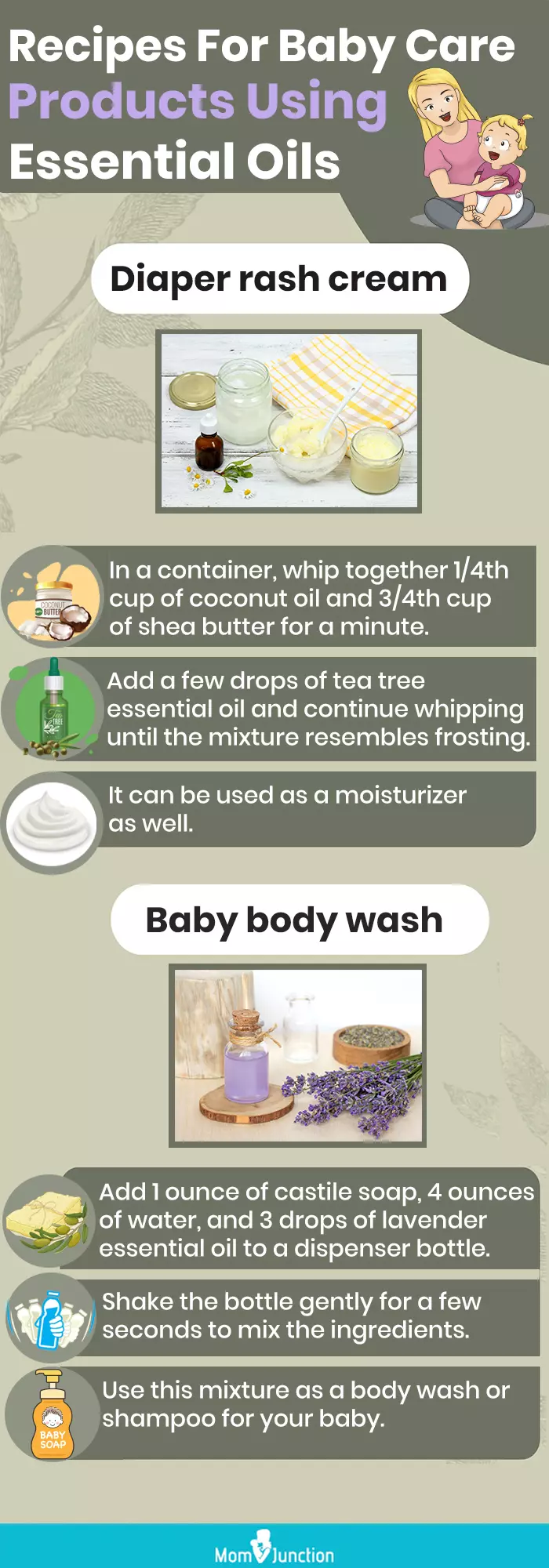
Illustration: Essential Oils For Teething Babies: Safety & Possible Uses
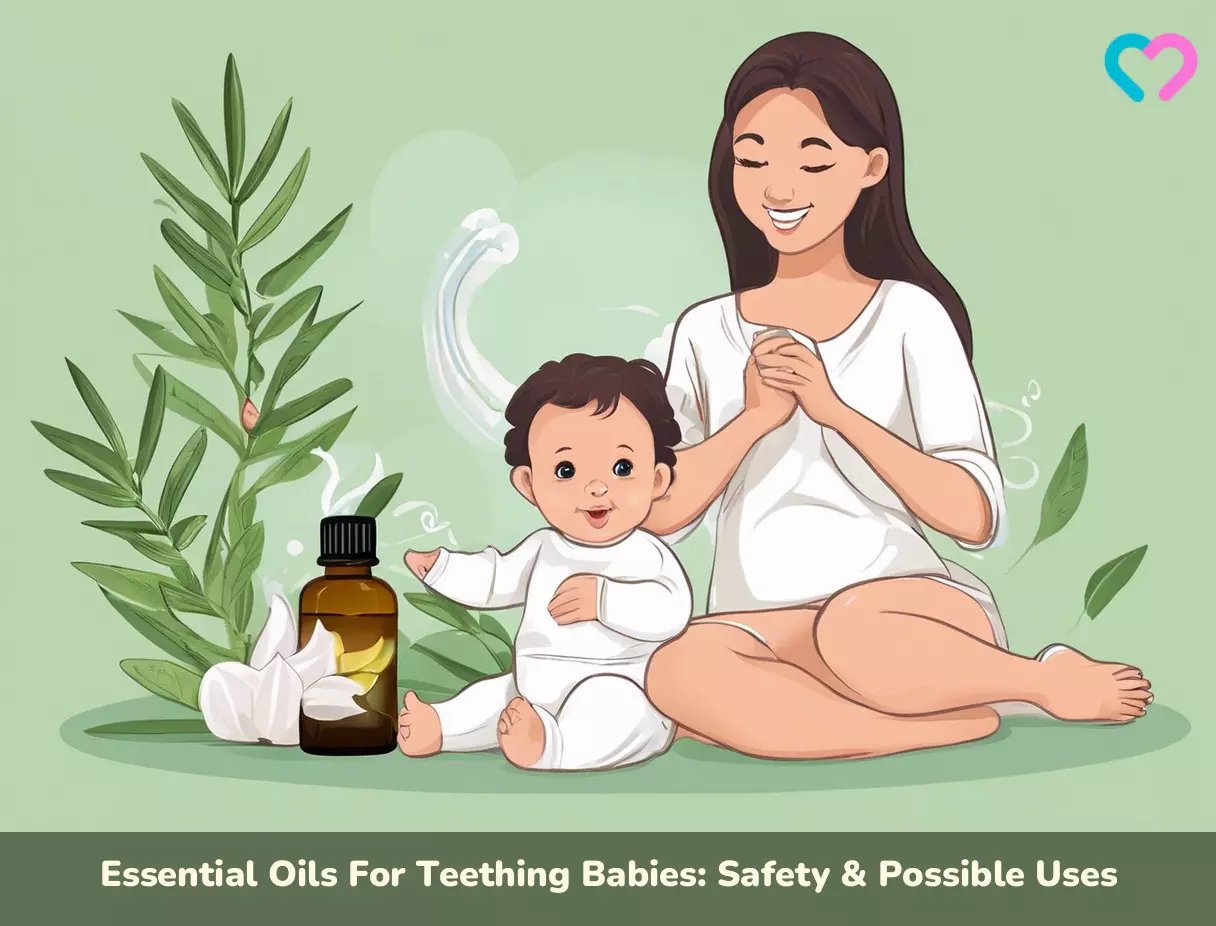
Image: Stable Diffusion/MomJunction Design Team
Understand the proper usage of essential oils for teething infants. Learn about their benefits and receive expert advice on ensuring safe usage for your precious little one.
Personal Experience: Source
MomJunction articles include first-hand experiences to provide you with better insights through real-life narratives. Here are the sources of personal accounts referenced in this article.
i. Sandy’s motherhood blog: Food, fun, fashion: March 2010.https://sandysmotherhoodblog.blogspot.com/2010/03/
References
- When Does Teething Start?
https://www.healthychildren.org/English/ages-stages/baby/teething-tooth-care/Pages/Teething-4-to-7-Months.aspx - Teething and your baby.
https://www.healthywa.wa.gov.au/Articles/S_T/Teething-and-your-baby - Teething.
https://www.mouthhealthy.org/all-topics-a-z/teething/ - Aromatherapy.
https://www.takingcharge.csh.umn.edu/how-do-i-choose-and-use-essential-oils - Can you use aromatherapy for babies?
https://www.mgpl.org/sites/default/files/2022-06/Aromatherapy%20for%20Babies_0.pdf - S Ebrahimi and S Ashkani; (2008); A Comparison Of Chamomile And Placebo In Relieving Teething Symptoms.
https://adc.bmj.com/content/93/Suppl_2/pw308 - 7 Tips That Can Help You Survive Teething.
https://jamaicahospital.org/newsletter/7-tips-that-can-help-you-survive-teething/ - Allergies, overweight, and other conditions.
https://www.unicef.org.uk/babyfriendly/news-and-research/baby-friendly-research/infant-health-research/infant-health-research-allergies/ - Farideh Vaziri et.al; (2019); The Effect of Aromatherapy by Lavender Oil on Infant Vaccination Pain: a Double Blind Randomized Controlled Trial.
https://pubmed.ncbi.nlm.nih.gov/30915309/ - Shweta Kajjari et.al; (2022); The Effects of Lavender Essential Oil and its Clinical Implications in Dentistry: A Review.
https://pmc.ncbi.nlm.nih.gov/articles/PMC9357533/ - Shruthi Eshwar et.al; (2016); Comparison of Dill Seed Oil Mouth Rinse and Chlorhexidine Mouth Rinse on Plaque Levels and Gingivitis – A Double Blind Randomized Clinical Trial.
https://pmc.ncbi.nlm.nih.gov/articles/PMC4911748/ - Julie L Ryan and Gary R Morrow; (2016); Ginger.
https://pmc.ncbi.nlm.nih.gov/articles/PMC5008850/ - Farshid Rayati et.al; (2017); Comparison of anti-inflammatory and analgesic effects of Ginger powder and Ibuprofen in postsurgical pain model: A randomized, double-blind, case–control clinical trial.
https://pmc.ncbi.nlm.nih.gov/articles/PMC5356382/ - Fatemeh Bina and Roja Rahimi; (2016); Sweet Marjoram.
https://pmc.ncbi.nlm.nih.gov/articles/PMC5871212/ - Cláudia ACG Simões et.al; (2016); Antibacterial Activity of Copaiba Oil Gel on Dental Biofilm.
https://pmc.ncbi.nlm.nih.gov/articles/PMC4911736/ - Niele Matos Gomes et.al; (2007); Antinociceptive activity of Amazonian Copaiba oils.
https://pubmed.ncbi.nlm.nih.gov/17029841/ - Eugenol (Clove Oil).
https://www.ncbi.nlm.nih.gov/books/NBK551727/#:~:text=In%20vitro%2C%20eugenol%20has%20been,were%20commonly%20used%20in%20dentistry. - Grant T McIntyre and G M McIntyre; (2002); Teething troubles?
https://www.researchgate.net/publication/11440282_Teething_troubles - Safety Information.
https://naha.org/explore-aromatherapy/safety - What are Hydrosols?
https://naha.org/explore-aromatherapy/about-aromatherapy/what-are-hydrosols - M Khosravi Samani et.al; (2011); The effect of Frankincense in the treatment of moderate plaque-induced gingivitis: a double blinded randomized clinical trial.
https://pmc.ncbi.nlm.nih.gov/articles/PMC3304380/ - Are Essential Oils Safe for Children?
https://www.hopkinsmedicine.org/health/wellness-and-prevention/are-essential-oils-safe-for-children - How to Use Essential Oils Safely?
https://tisserandinstitute.org/safety-guidelines/ - Teething Remedies for Your Baby’s Aching Mouth.
https://health.clevelandclinic.org/teething-remedies? - Teething Pain: Risky Remedies to Avoid.
https://www.chop.edu/news/teething-pain-risky-remedies-avoid - 5 Remedies to Ease the Pain of Teething Safely.
https://www.dignityhealth.org/articles/5-remedies-to-ease-the-pain-of-teething-safely - Teething.
https://www.nationwidechildrens.org/family-resources-education/health-wellness-and-safety-resources/helping-hands/teething - Teeth development in children.
https://www.betterhealth.vic.gov.au/health/conditionsandtreatments/teeth-development-in-children - Essential Oils: Poisonous when Misused.
https://www.poison.org/articles/essential-oils
Community Experiences
Join the conversation and become a part of our nurturing community! Share your stories, experiences, and insights to connect with fellow parents.
Read full bio of Dr. Deepshikha Thakur
- Dr. Scott Cardall is an orthodontist based in Orem, Utah. He attended the Harvard School of Dental Medicine and did his Orthodontics residency program at Oregon Health & Science University.
 Dr. Scott Cardall is an orthodontist based in Orem, Utah. He attended the Harvard School of Dental Medicine and did his Orthodontics residency program at Oregon Health & Science University.
Dr. Scott Cardall is an orthodontist based in Orem, Utah. He attended the Harvard School of Dental Medicine and did his Orthodontics residency program at Oregon Health & Science University.
Read full bio of Swati Patwal
Read full bio of Rohit Garoo
Read full bio of Anindita Ghatak






